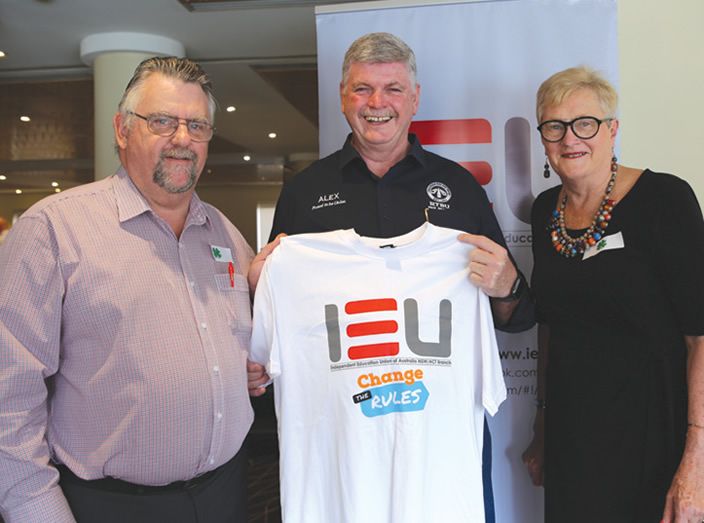
IEUA NSW/ACT Branch Secretary John Quessy, Alex Claassens and IEUA NSW/ACT Branch President Chris Wilkinson
The recent dispute between the NSW Government and railway workers exemplifies why we need to change the rules.
Rail, Bus and Tram Union Secretary Alex Claassens spoke eloquently at the IEUA NSW/ACT Branch Council meeting on 17 March about how his union “jumped through every legal hoop” and yet was still denied the right to strike.
Alex, a train driver since 1978, said rail workers were proud of their profession: “It’s more than a job, it’s our life.”
He objects to the media referring to him as a ‘union boss’, saying “I’m just a train driver elected by other train drivers to speak on their behalf”.
He said NSW Railways had been under attack from the conservative government for many years, but recently Transport Minister Andrew Constance had overseen the axing of jobs, services and the privatisation of elements of the network, and “he’s taken every opportunity to publically ridicule the hard working men and women of our railways”.
Alex said workers were stretched to capacity, working rostered days off to try and make the new timetable work.
“At the same time as Andrew Constance’s timetable was falling to pieces, negotiations for a new enterprise agreement were also falling apart.” Alex said the union had spent months trying to negotiate over the log of claims for the new enterprise agreement.
"The Minister was not involved and the management team would not move on any of the union’s claims," he said.
“After negotiations stalled, we jumped through every legal hoop and applied to run a protected ballot of our membership.
“The overwhelming majority of our members wanted to have the option of taking protected industrial action.
“Despite being given every conceivable opportunity to negotiate a fair agreement, management refused, which left us with no option but to start the process of taking action.”
The union had a badge day and an overtime ban, which resulted in services having to be cancelled.
A 24 hour stoppage was announced for 29 January, a day chosen to minimise disruption to commuters.
“This revealed the real extent of how broken the rules for workers in Australia are. Despite crossing every ‘T’ and doting every ‘I’, the government was able to drag us into the Fair Work Commission and the commission ordered us to suspend action for six weeks.
“We were even forced to suspend our overtime ban. The rationale was that our legal action would have endangered people’s lives. That’s an incredibly long bow to draw.
“The union team acted in good faith the whole way, the government and management stonewalled all attempts to reach an agreement, and the commission ruled that we needed to pause our action.
“The pendulum of fairness has swung too far in favour of the bosses. There’s no doubting the situation in the NSW railways shows that the right to strike in Australia is very nearly dead.
“Despite doing everything by the book, our bargaining power has been taken away. Workers who are just trying to earn a decent wage are being robbed of our rights.
“The UN describes the right to withdraw your labour as a basic human right, but it’s being taken away from us in Australia.
“It’s time that we all stand up together and fight back and fix the rules.”


































































































































